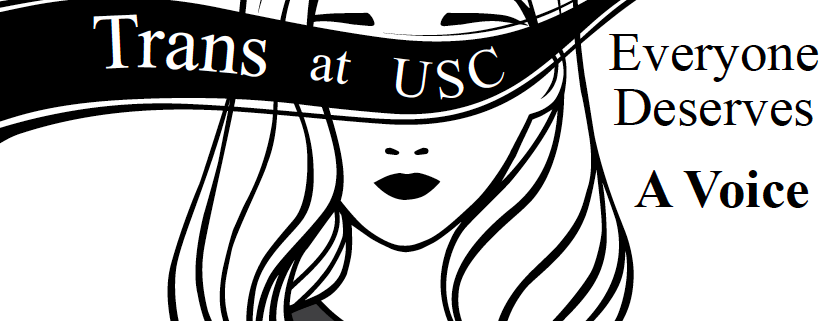Despite visibility, trans individuals remain unequal
The LGBTQ community has overcome many feats within the last year, most notably the nationwide legalization of same-sex marriage following a Supreme Court decision in June. Though the legal rights of gay and lesbian citizens have been expanding in the United States, the fight for equality is far from over for the transgender community both nationwide and here at USC.
With the tremendous amount of coverage transgender activists have garnered this year, the trans movement has finally secured its placement in mainstream media. On July 15, TLC premiered the new reality series I Am Jazz, detailing the daily life of transgender teenager Jazz Jennings. Less than two weeks later, E! network debuted I Am Cait, a reality series documenting the gender transition of Caitlyn Jenner, formerly known as Bruce Jenner. The premiere followed Jenner’s widely publicized Vanity Fair cover in June.
Even so, compared to the support that the gay and lesbian communities have received, many of us often forget about the ‘T’ in LGBTQ. And though the public seems to have become more tolerant of trans issues, transgender individuals deserve more than blind tolerance. The needs of all trans people must be provided before equality is met. Though Jenner’s Vanity Fair cover was met with overwhelming praise, the majority of comments were directed toward her “beauty” and physical appearance — as Jon Stewart stated on The Daily Show in regard to the public’s reaction: “Welcome to being a woman in America.” At the risk of belittling Jenner’s valor, it must be noted that Jenner represents a small portion of the transgender community; Jenner’s financial privilege allowed her to acquire the expensive medical treatment necessary for transitioning, a luxury that many transgender citizens do not have.
Applauding Jenner’s “beauty” without first acknowledging her needs propagates the message that we only accept and validate our transgender citizens when they appeal to our society’s beauty binaries. Many transgender celebrities and allies have spoken out in regard to this stigma.
“There are many trans folks because of genetics and/or lack of material access who will never be able to embody these standards,” said Laverne Cox, actress and transgender advocate, in response to Jenner’s Vanity Fair cover. “More importantly, many trans folks don’t want to embody them, and we shouldn’t have to be seen as ourselves and respected as ourselves.”
John Oliver devoted a segment on his show Last Week Tonight to transgender rights, arguing that we glorify transgender individuals on their “bravery” while simultaneously ignoring their demands. Indeed, we have established an unjust dichotomy between providing moral support and rejecting their needs when it makes us uncomfortable. No two trans people or experiences are the same, just as no two cisgender — people whose gender identity agrees with their assigned sex at birth — individuals are. If you’re unsure of what a trans person needs, ask — individually and respectfully.
Though some businesses and organizations are just now beginning to demonstrate their support for the trans movement, USC has already done a fair job in considering its transgender students — though there is definitely room for improvement. The university’s LGBT Resource Center has done tremendous work providing for trans students. The USC Student Health Insurance Plan incorporates transgender medical needs under its coverage, which includes “clinician visits, medication, surgeries, diagnostic testing for pre-op and more.”
In addition, the University has established trans-friendly housing, including the Rainbow Floor in Century 2 Apartments, as well as single-residence housing, and has mapped all the gender-neutral restrooms on campus. However, though these on-campus offices serve our transgender students, the administration itself does almost nothing to advocate or promote LGBTQ rights. Evan Pensis, a senior majoring in piano performance and linguistics, expressed his disapproval regarding the administration’s lack of involvement in LGBTQ issues.
“Professional organizations for trans people have low to no visibility on campus,” Pensis said. “The representation of trans in USC advertising and marketing is nonexistent.”
Pensis, who is also involved with RISE Alliance and the Office for Wellness and Health Promotion on campus, challenges the administration to speak up on trans rights.
“I urge USC and President Nikias to position themselves differently…To define leadership not in what’s been done before for trans and queer students, but to demonstrate leadership that respects and supports our LGBTQ students and allies.”
USC is notorious for its inconsistency regarding LGBTQ activism. It took five years and many legal battles for USC’s first Gay Student Union to be recognized as an official student organization in 1975. With the new school year upon us, it is imperative to stand together and demand that the administration speak out on these matters. President Nikias and the Board of Trustees must break the silence regarding trans-related issues. USC should vocalize support for the trans community and ensure that their comfort and safety are being met. Not all students wish to be confined to the gender binaries the school unconsciously places on campus. Trojans are not just “men” and “women”; we represent a wider span of individuality that should be acknowledged and celebrated.

